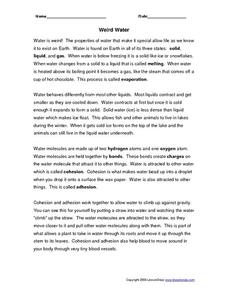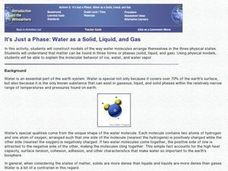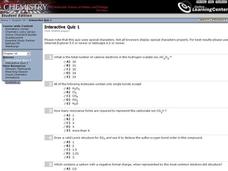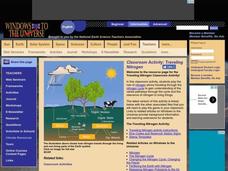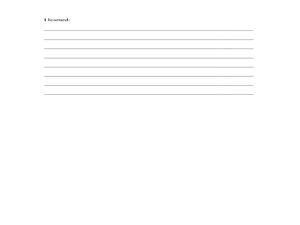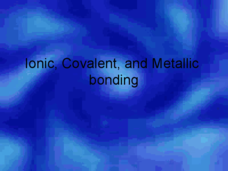Curated OER
Activity #3 Are Particles "Real?"
Students verbalize a simple particle theory, They apply their particle theory to explain what happens during chemical reactions and how this theory supports the law of conservation of matter. Pupils comprehend that the atomic theory,...
Curated OER
Weird Water
In this weird water instructional activity, students read for information and assess comprehension. In this true and false, fill in the blank, and multiple choice instructional activity, students answer ten questions.
Curated OER
Polymers Lab: Bouncy Ball and Slime
Eighth graders investigate chemical reactions to produce polymers. In this polymers lesson plan, 8th graders experiment with sodium silicate and ethyl alcohol to make a polymer. They also experiment with borax and glue to make a polymer....
Curated OER
Buckyball
In this molecules instructional activity, students read about the discovery of new carbon molecule which has been nicknamed buckyball. Students answer 2 short answer questions.
Serendip
Where Does a Plant's Mass Come From?
Where does the mass for a growing tree come from? Scholars consider a few different hypotheses and guess which is correct. They then analyze data from different experiments to understand which concepts science supports.
Curated OER
Organic Chemistry Reactions
In this organic chemistry reactions worksheet, students are given a table with 8 different types of reactions that occur with organic molecules. Students answer 3 questions about the reactions given in the table and indicate which...
Curated OER
Integrating Environmental Science-Ozone Depletion
In this ozone activity, learners read about the ozone layer, its make-up and its depletion. They answer three critical thinking questions about ozone and the ozone layer.
Curated OER
Catering Middle-School Science: Monomers, Polymers, and Macromolecules
Students investigate foods. In this biology lesson plan, students will conduct testing on different types of foods as they learn about different molecules that make them up. Students will also learn about the shapes of the molecules.
Curated OER
It's Just a Phase: Water as Solid, Liquid and Gas
Students construct models of the way water molecules arrange themselves in three physical states - solid, liquid, and gas. They explain the molecular behavior of ice, water, and water vapor.
Curated OER
Different Minerals
In this minerals worksheet, students read about the relationship between elements, rocks and minerals. They experiment using 6 different colored gumdrops to represent 6 common elements. Students construct gumdrop and toothpick models of...
Curated OER
Reading Chemical Formulas
Students interpret basic chemical formulas. When class begins, students interpret a "chemical formula" for fruit salad. After they interpret the recipe, students use the same strategies to identify chemical formulas. They evaluate the...
Curated OER
Chemistry and Bonding
In this bonding worksheet, students take an interactive quiz with 15 multiple choice questions about the VSEPR Theory, bonding, the geometry of molecules, Lewis structures, resonance structures and enthalpy changes.
Curated OER
Surface Water and Groundwater
Students examine distribution of water and minerals. In this surface and groundwater instructional activity, students conduct an experiment with fresh and salt water making hypothesis and drawing conclusions about minerals.
Curated OER
IPC Chemistry Review
In this chemistry review activity, high schoolers classify and name compounds, calculate atomic mass, draw Lewis Dot Diagrams, and determine number of protons for atoms. This activity has 37 fill in the blank, 38 matching, and 3 short...
Curated OER
Ratio and Proportion
In this ratio and proportion worksheet, students solve 22 short answer and multiple choice problems. Students use rates, proportions, and ratios to solve each problem.
Curated OER
Direct Variation
In this Algebra I/Algebra II worksheet, students solve problems involving direct variation. The two page worksheet contains a combination of twelve multiple choice and free response questions. Answers are included.
Curated OER
Boot Reer Root Beer
Fifth graders investigate chemical reactions. In this physical science lesson, 5th graders make dry ice root beer and identify the type of change that occurs to the root beer mixture.
Curated OER
Covalent Compounds
In this covalent compounds activity, students answer 8 questions about bonding in covalent compounds, covalent bonds, and diatomic molecules. Students draw 2 dot diagrams showing covalent bonding. They answer 4 questions about bacteria...
Curated OER
Candy Reaction
In this triboluminescence worksheet, young scholars use wint-o-green Lifesavers to observe a chemical reaction that gives off light. They break a lifesaver up with a hammer and make observations and they chew a lifesaver and make...
Curated OER
Traveling Nitrogen
Students act out the cycling of nitrogen through the environment. In this nutrient cycle activity, students role play as nitrogen atoms traveling through the nitrogen cycle. They travel to stations and roll dice to determine the pathways...
Curated OER
Heat and Matter
Students explore liquids and solids by conducting in class experiments. In this matter lesson, students define the properties of matter and how heat can change those properties. Students experiment with heating objects such as butter and...
Curated OER
Carbon Trip Through the Cycle
Students, in any written format they choose, imagine themselves as a carbon atom and trace their journey through the carbon cycle returning themselves to the point of origin.
Curated OER
Kinetic and Potential Energy
In this kinetic and potential energy worksheet, students read for information and evaluate comprehension. In this multiple choice and fill in the blanks worksheet, students answer fifteen questions.
Curated OER
Ionic, Covalent, and Metallic Bonding
You may want to make a few changes before sharing this slide show with your chemistry class. For one, remove the bright blue swirly background that makes the black font hard to read. Ionic bonds are described with the use of an electron...



